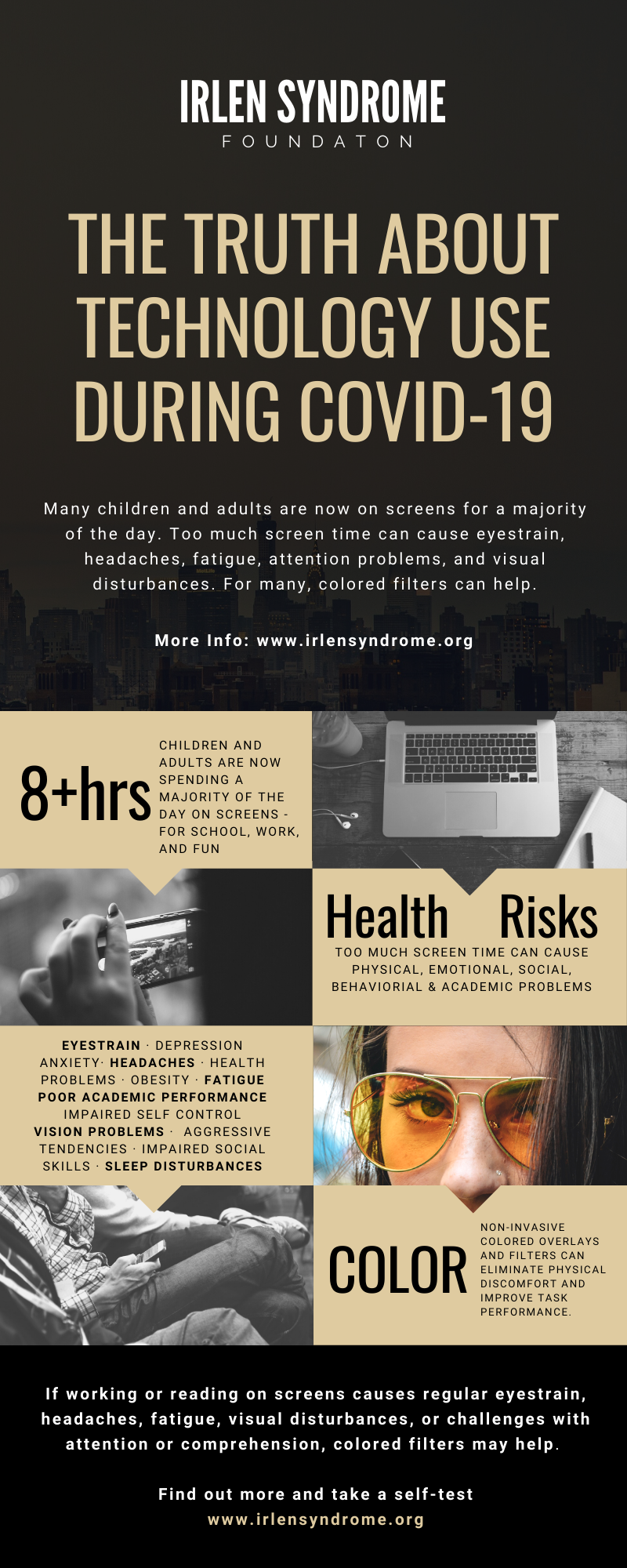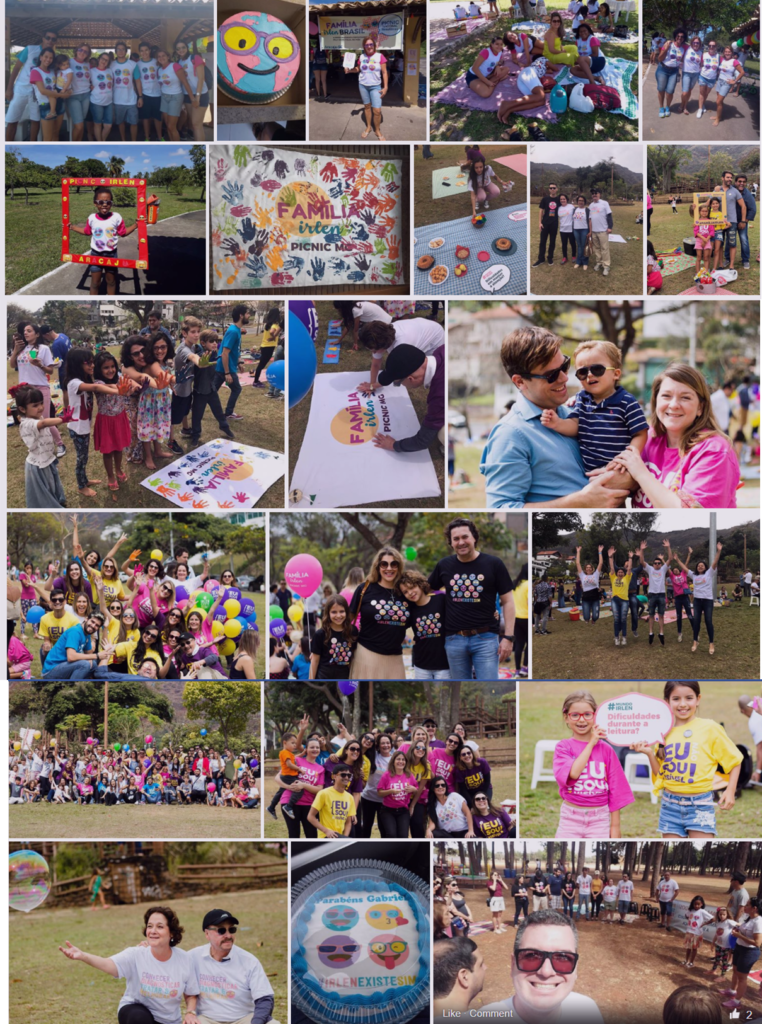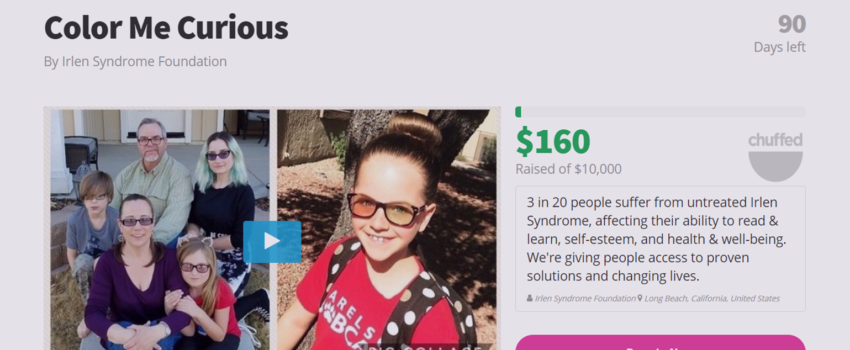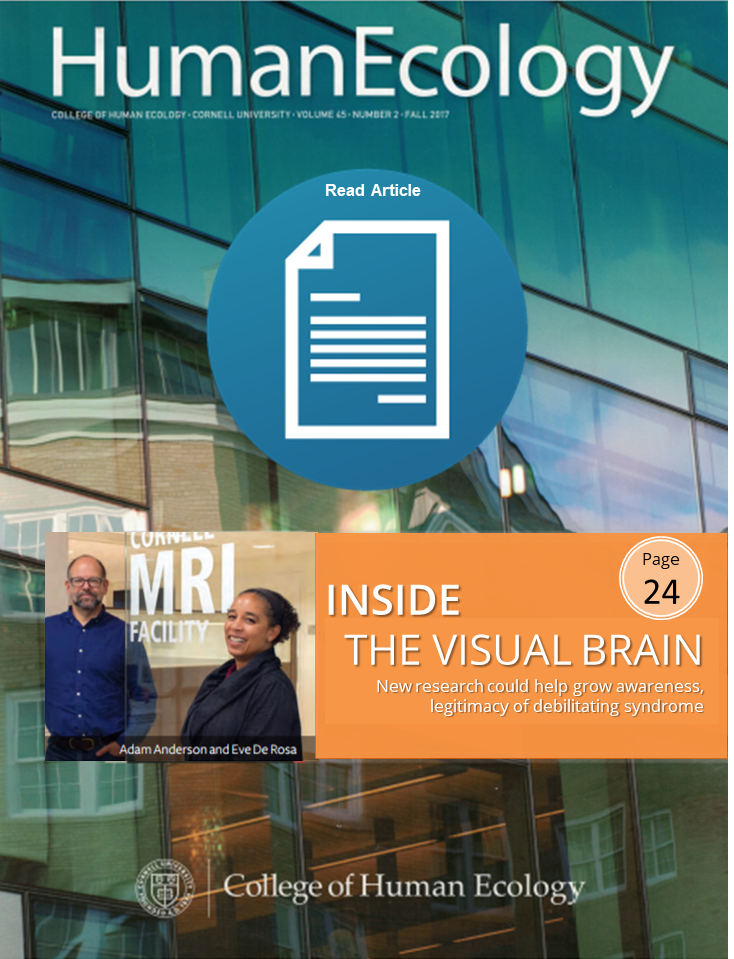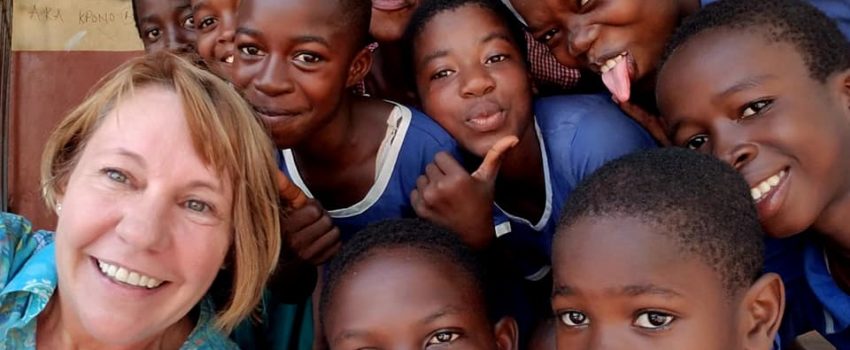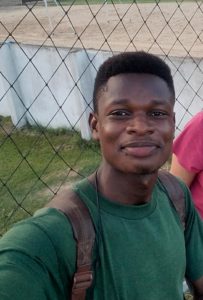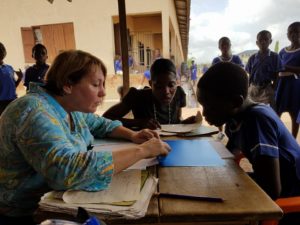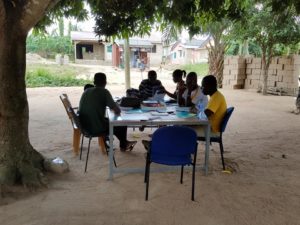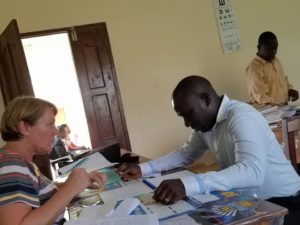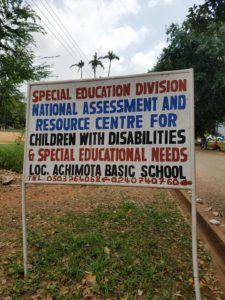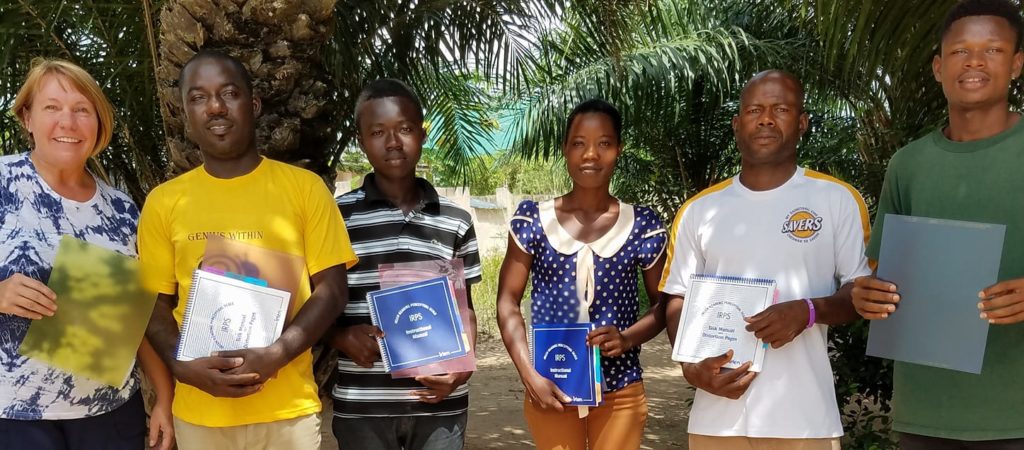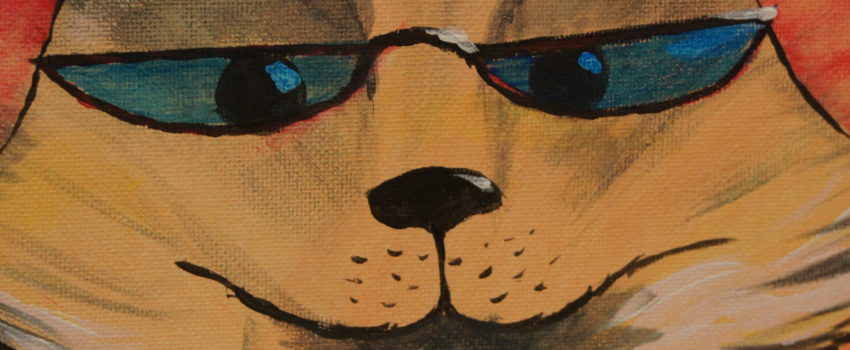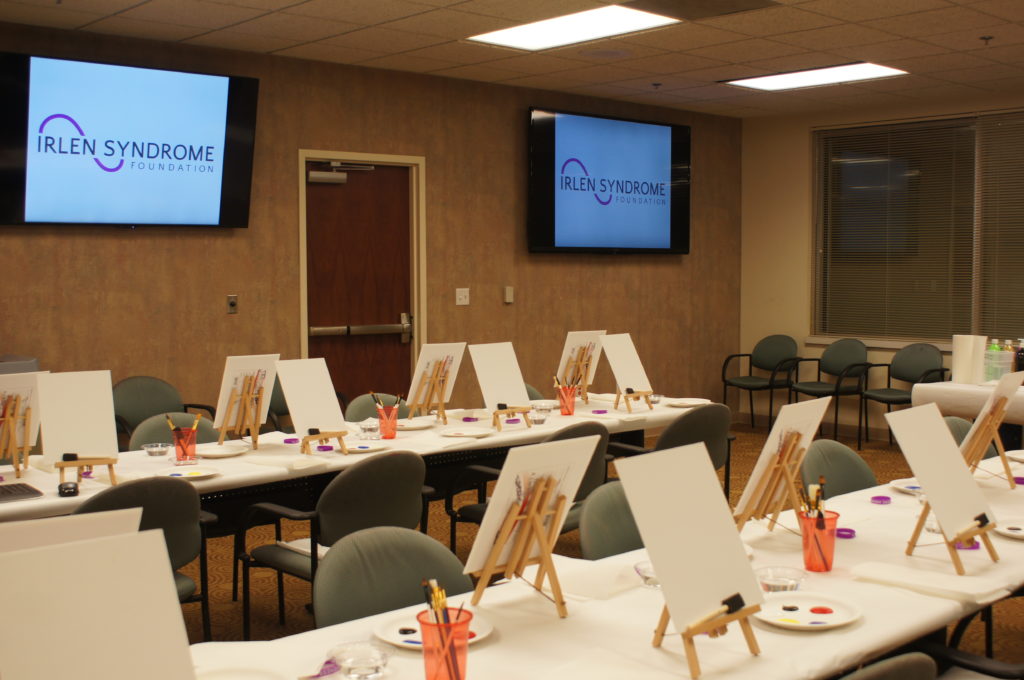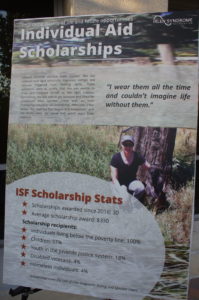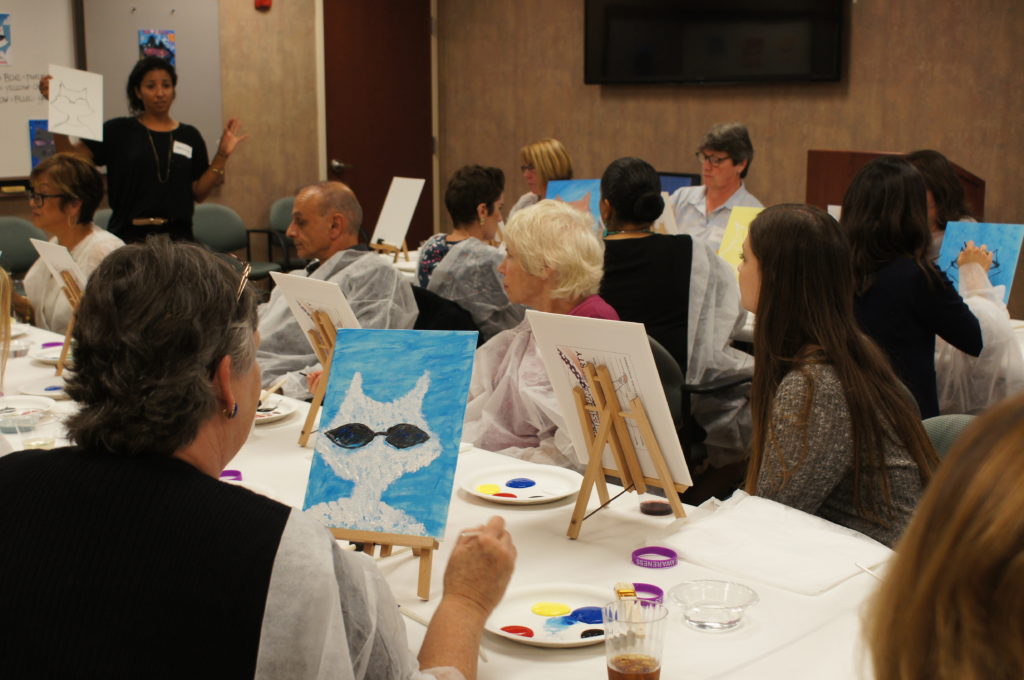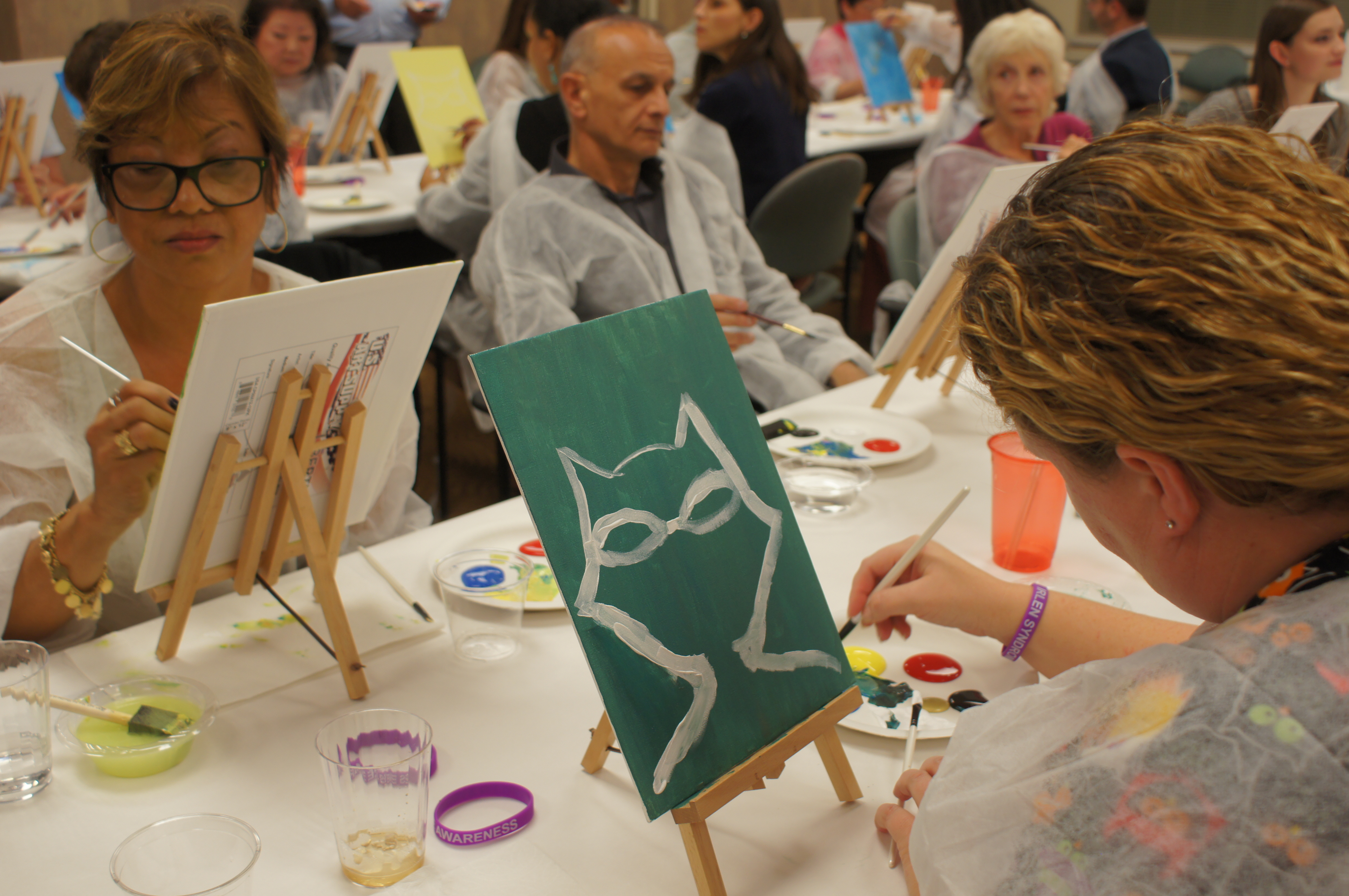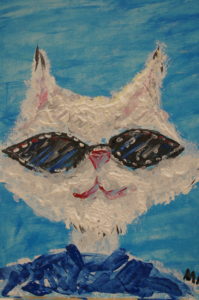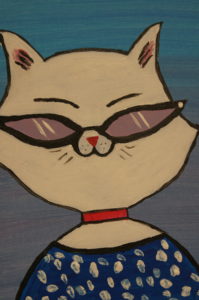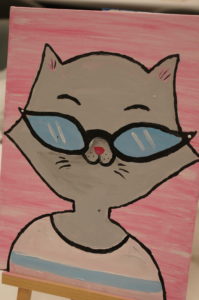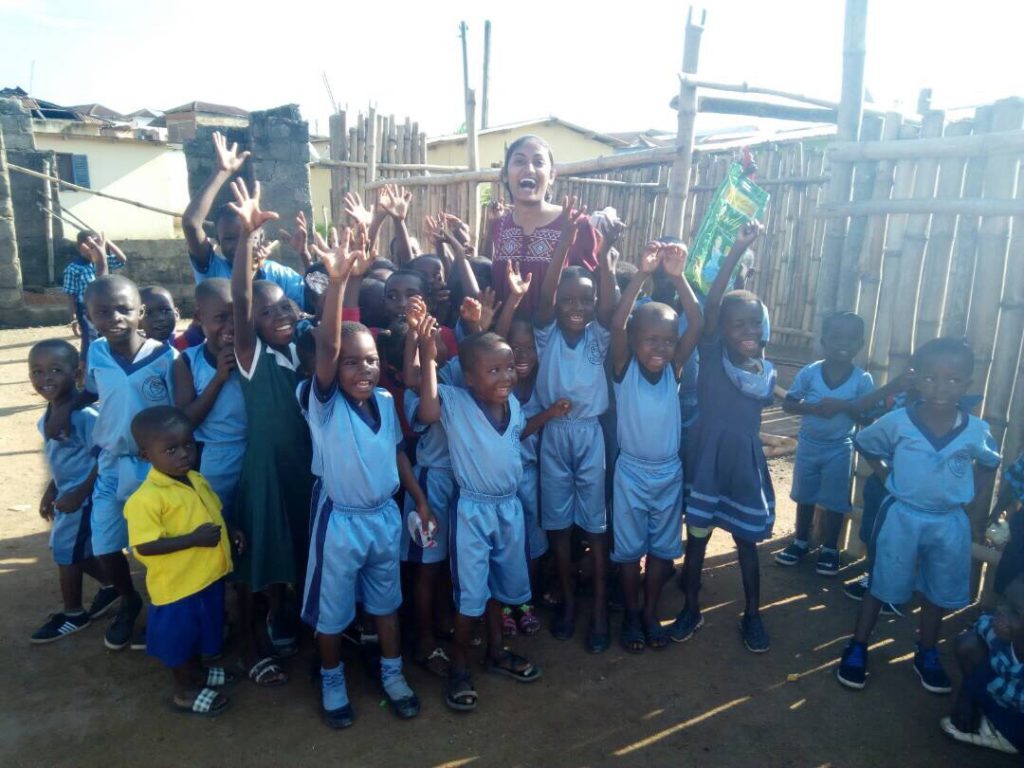Irlen Family Picnics Take Over Brazil
Irlen Syndrome Awareness Week may not be until October, but Irlen families in Brazil have taken awareness into their own hands with their Irlen Family Picnics and #IrlenDoesExist movement. On August 5th, families gathered in 27 cities in Brazil, 1 city in Italy, and 1 city in the USA to show solidarity, raise awareness, and make new friends! We asked Ana Paula Federicci, one of the main coordinators of this incredible multi-city event, to share with us how it all came together.
My name is Ana Paula D. B. Federicci, I have two children, 14-year-old Luis Felipe and 11-year-old Gabriela, and all three of us discovered we have Irlen Syndrome in October 2016. Early in July, 2017, through a WhatsApp chat group formed by patients, relatives, friends, and professionals who live with the Irlen Syndrome and share experiences and knowledge, we had the idea of a picnic. The objective of this gathering was to strengthen and materialize the force and bond of the Irlen group, showing children, teens and relatives that there are many others like them and that they are not alone. We also wanted to make the #IrlenDoesExist movement public, so as to obtain acknowledgement by 100% of the middle class, and to gain the attention of media and government to recognize Irlen Syndrome so that the diagnostics and treatments could be accessed by all patients.
The first Irlen family picnic happened in 2017 and turned squares and parks in 8 Brazilian cities colorful and happy. Everyone had a lot of fun through
conversations and entertainment. It was such a huge success, that in 2018, we began preparing earlier for the 2nd Irlen family picnic. This year, we had Irlen Family Picnics in 27 different Brazilian cities, 1 city in Italy and 1 in the USA.
We had a wonderful exchange of experiences, information, music, dance, entertainment for children and teens. The atmosphere was contagious to
everyone; once more we had parks and squares filled with color and the number of attendees only grew. Now it is a tradition! Every year we will repeat it on the 1st Sunday of August and we are stimulating people through Facebook and WhatsApp to expand the event around the world, as it happened in Houston, Texas – USA and Bergamo, in Italy, showing the world that Irlen Does Exist!
2018 – Cities which held the Irlen Family Picnic:
Brazil
Aracaju – SE, Belo Horizonte – MG, Brasília – DF, Campinas – SP, Cuiabá – MT, Curitiba – PR, Fortaleza – CE, Joao Pessoa – PB, Juiz de Fora – MG,
Macaé – RJ, Maceió – AL, Maringá – PR, Natal – RN, Osorio – RS, Ourinhos – SP, Petropolis – RJ, Porto Alegre – RS, Recife – PE, Resende – RJ, Rio de
Janeiro – RJ, Salvador – BA, São Bento do Sul – SC, São Paulo – SP, Vale do Paraíba – SP, Vitoria – ES, Wenceslau Braz – PR
United States
Houston, Texas
Italy
Bergamo
These are just a few of the hundreds of photos from the big day!
Save the Date for the next Irlen Family Picnic: August 4, 2019
More information and pictures from the annual Irlen Family Picnics at https://www.facebook.com/pg/irlenexistesim/photos/?tab=album&album_id=248709902428658
Ana Paula’s blog: https://irlen.blog/
Color Me Curious: The Summer Scholarship Fundraiser
ISF is excited to kick off our summer fundraising campaign! August 1st is the official start to the 30-day fundraising campaign, in conjunction with the Irlen Parent Connection Facebook Group. We have a lofty $10,000 goal, and every cent goes towards Irlen scholarships for individuals from low-income families. As you know, Irlen Spectral Filters change lives, and we’re making sure everyone who needs Irlen Spectral Filters can get them.
Here is the link to the fundraiser: https://www.chuffed.org/project/color-me-curious. (You’ll get a free t-shirt with a $30 donation).
Help us reach our $10,000 goal by making a donation, sharing the link with others, or, joining our team by clicking the red button at the bottom of the fundraiser page that says “Create Your Own Fundraiser Page”, so that you can customize it with your own story, thoughts, information, etc. to send to the people you know.
The Visual Brain
The ISF Ghana Project Takes Flight
On November 7, Dr. Jeri LaVigne flew from Atlanta, GA to Ghana on behalf of the ISF Ghana Project to train five members of CLED (Campaign For Learning Disabilities) how to screen for Irlen Syndrome. Dr. Jeri and her team from CLED accomplished a lot during her week-long stay. Not only did they complete their Irlen training, but they met with the country’s educational policy makers, the Department of Education and the Special Education Division of the National Assessment and Resources Center. They screened children at multiple schools during the training week, and CLED director, Padmore Quansah and his team continued school screenings immediately following Dr. Jeri’s departure from Ghana. This outstanding team of Irlen screeners is taking the country by storm, and we look forward to hearing how implementing Irlen screening country-wide changes educational success of the children in Ghana.
Below are Dr. Jeri’s daily logs from the trip – enjoy!
November 8
This is Moses, one of the CLED employees and a soon to be Irlen Screener. We walked from the office to his house tonight through town, Kasoa. We had dinner at his house. His mom made Ampesi with fresh yams and plantains from the yard. And yes, that’s a mango tree.
November 9
We walk everywhere. And then if we have a long way to go, we hire a taxi. Today we went to the Dept. Of Education to get permission to work in the schools.
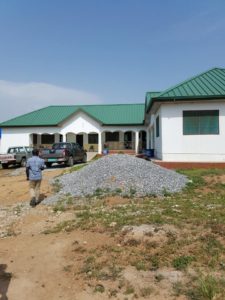
November 10 Oduponkpehe, Ghana
Screening at our first school!
November 11
Sometimes we have electricity and sometimes we don’t. Today we have to improvise and move the training outside under the mango tree because it’s too hot inside with no fan.
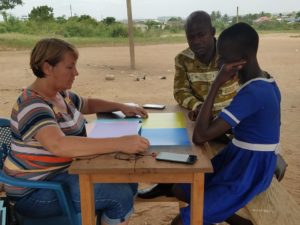
November 13 Asabaham, Ghana
This morning we took a mini bus and went to screen students at another elementary school, Opeikuma St. Peter’s Angelican School. Then we went to the Dept. Of Education again to give a presentation and ask for their support so Padmore and his team at CLED can continue to screen and assist children in the schools. All of the 15 administrators wanted to be screened!
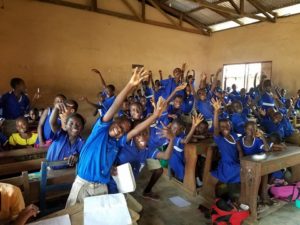
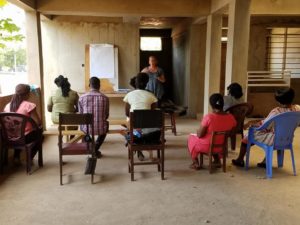
November 14
The Special Education Division of the National Assessment and Resources Center heard about what we have been doing in the schools and asked us to come to Accra today to present the Irlen Method and our findings so far. It was a wonderful experience and they were excited to learn a new way to help their children that struggle. I’m not sure what I was expecting exactly for their national offices in the Capital, but think twice before you complain about your work space.
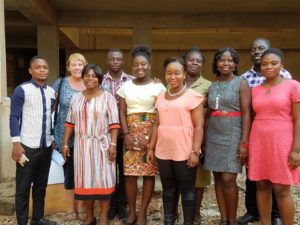
November 15
I would like to introduce you to the first Ghanian Certified Irlen Screeners. Padmore Quansah, Nicholas Aidoo, Akpene Genevieve Dagadu, Anthony Mengah Nsenyiane, and Moses Dickson from CLED – Campaign for Learning Disabilities. We wish them much success! Ayekooo (Well done)
A Colorful Night of Awareness and Fundraising
The Irlen Syndrome Foundation’s Board of Directors and their invited guests kicked off Irlen Syndrome Awareness Week on Saturday, October 14th with a night of painting to raise money for scholarships for Irlen testing. Guests were treated to food and drinks generously donated by Thrive Kitchen LA, and heard personal testimony from Irlen Spectral Filter wearers, including retired Naval officer and brain injury client, Jeff Doran, before participating in the evening’s main event – a painting class led by children’s book illustrator, Christina Forshay.
Board President, Sandra Tosta, shared updates on the organization’s current projects and announced the kick-off of the foundation’s $10,000 scholarship campaign. The evening increased awareness of Irlen Syndrome among the local community, and successfully raise $2,500 for ISF scholarships to assist low-income families in receiving Irlen testing and Spectral Filters.
[caption id="attachment_908" align="aligncenter" width="1024"]
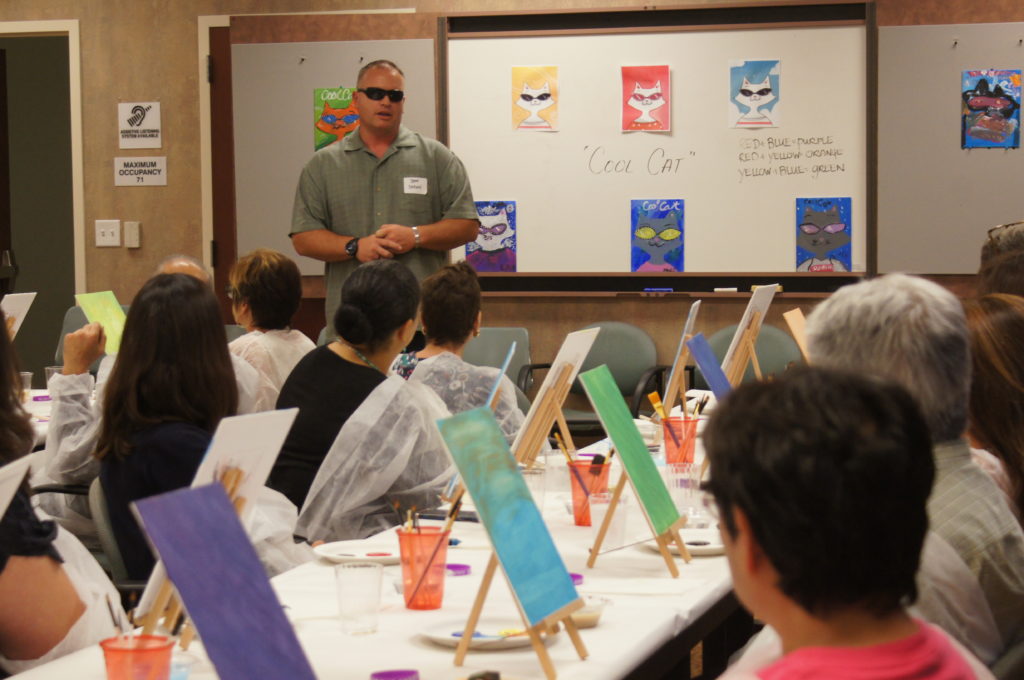 Retired Naval Officer, Jeff Doran, shares his personal Irlen story[/caption]
Retired Naval Officer, Jeff Doran, shares his personal Irlen story[/caption]
Check out some of the creative artwork inspired by the night’s theme “Cool Cat,” sporting all different colored Irlen Spectral Filters!
Help us reach our $10,000 scholarship goal with your $25 pledge today!
See What A Difference Color Has Made For Our Scholarship Recipients
ISF SCHOLARSHIP RECIPIENTS: WHERE ARE THEY NOW?
In this post, we catch up with some of our past scholarship recipients to see how receiving Irlen Spectral Filters has changed their lives.
It’s been a busy and rewarding year for the Irlen Syndrome Foundation! We’ve awarded more than 30 scholarships, but we are receiving more requests for aid than we are able to support. We recently launched the Individual Aid Scholarship Campaign, to raise $10,000 to fulfill these requests and double the number of people we can help this year. We’re excited to share the following updates on six of our recent scholarship recipients. See how your gift can change the life of someone with Irlen Syndrome.
Traumatic brain injury can cause some of the most severe symptoms of Irlen Syndrome. Here’s Mikayla’s story…
Mikayla “Mac” has suffered from multiple TBIs incurred over the 10 years she worked as a law enforcement officer, both on the job and during recreational activities. She has suffered with light sensitivity, migraines, vertigo, and seizures triggered from flashing lights. These symptoms were so severe, that she was unable to drive and confined herself to dim light indoors so as to mitigate the symptoms. Fortunately, she was able to get assessed and fitted for customized Irlen Spectral Filters with an Irlen Foundation Individual Aid Scholarship. After only a few weeks, she reported that her comfort and functioning level had immediately improved. She reported less fatigue and exhaustion, and is elated that she is finally able to leave her house and spend more time outdoors. All of her frustration and tenseness that resulted from being cooped up all day indoors has disappeared; so much so that her physical therapist noticed a difference right away. As of May 2017, she said that she still wears them all the time and couldn’t imagine life without them. She is now referring people for Irlen Spectral Filters who are in similar situations. She sends her thanks from Clark, Oregon to all of those who have donated to the Irlen Individual Aid Scholarship program as well as those who continue to help the Irlen Syndrome Foundation spread awareness of Irlen Syndrome!
Research has shown 80% of incarcerated adults suffer from severe Irlen Syndrome. By helping youth in the juvenile justice system, we’re making sure they don’t enter the adult prison population. Here’s an update from the Marion County Juvenile Justice Department in Oregon…
The following story of one juvenile justice department scholarship recipient reflects the significant challenges that Irlen Syndrome can pose to future success, if left unaddressed. Due to strict confidentiality required by the juvenile justice system, any personally identifying information for this youth has been removed from the testimonial excerpts below, provided by both the scholarship recipient, as well as her educational advocate in the juvenile justice system.
Recipient A is a 17 year old female in the Juvenile Justice System. She lives with her mother and a sibling, and they are on public assistance. She is the only one in the family that works, holding two jobs that equate to 40 hours per week. She participates in a multitude of appointments and has voluntarily engaged in a rigorous program, which will expunge her record, if it is completed successfully. Her goal is to graduate from high school, enter the military, and pursue a career in engineering. However, her difficulties with reading and physical symptoms caused by bright lighting are really holding her back. Her primary symptoms of discomfort included experiencing headaches and a strong sensitivity to fluorescent and bright lighting. As a result, she reported having frequent headaches. When reading, she loses her place, becomes distracted, uses a marker, and has poor comprehension; however, she still earned grades high enough to qualify for honor level coursework. Unfortunately, she failed a reading entrance exam for a particular school program. Prior to discovering her symptoms, her educational advocate was perplexed as to why she earned good grades yet had failed her reading entrance exam. It didn’t make sense, that is, until she reported the severity of her symptoms resulting from Irlen Syndrome. She was provided a peach colored overlay, which she used daily for reading, both with books and with a computer screen. She earned an “A” in a grade-level English literature course. Her educational advocate, seeing the massive improvement in her reading ability, spoke with her and her guardian about Irlen testing and Irlen Spectral Filters. Both were supportive and enthusiastic, as she reported that the use of the overlay has a huge impact in terms of alleviating her reading discomfort and difficulties.
After receiving her Irlen Spectral Filters, Recipient A provided the following update on her progress, “Since I have been wearing my glasses, I don’t get headaches. My eyes don’t hurt. They have helped me feel more comfortable when I am outside or around fluorescent lights. Before I got my glasses, I would have to reread lines. I would also lose my place. Now I don’t have those problems.”
It is important that our veterans return home with full functionality so that they can make the most of the freedoms and opportunities they fought to preserve. Some return home suffering from Irlen-related symptoms as a result of traumatic brain injuries…
Justin, a disabled military veteran, suffered from anxiety and experienced Irlen Syndrome symptoms when he tried to read or was in a bright environment. He was recommended for the Individual Aid Scholarship by his local diagnostician, and, after receiving it, was amazed by the results.
Justin: “I am feeling calmer, more focused, lights don’t bother me in stores, I can read faster, process faster, balance is good, symptoms come back instantly without filters, can now use a cell phone and computer – was unable to for years because the screen bothers me.”
Justin now wants to go back to school at a technical college!
Classroom environments that contain bright fluorescent lights can exacerbate Irlen Syndrome Symptoms, and make school unbearable…
Moises suffered from extreme light sensitivity and migraines that caused him to miss 95 days of school over the course of 2 years. He constantly struggled in the classroom and was unable to concentrate for long periods of time without breaks. As a result, he fell behind and wasn’t reading at his own grade level. He would regularly take 30-45 minutes breaks when trying to complete school work, in an effort get his symptoms to go away. What should have taken him 1 hour to finish ended up taking him about double the time to complete. Whenever he was asked a question in class, he would walk out of the classroom frustrated and anxious. After being awarded an ISF Scholarship and receiving customized Irlen Spectral Filters, he is finally able to concentrate for longer periods of time and has gained the confidence to articulate his thoughts and participate in classroom discussions!
Leo, an 18 year old student, moved to Washington to support his struggling family. In a stroke of bad luck, he was assaulted. His brain was damaged in the incident and he became partially paralyzed. After his brain injury, he started showing signs of Irlen Syndrome…
After he recovered from his medical treatments and injuries, Leo tried to go back to school. However, whenever he tried to read textbooks, whiteboards, and other reading materials, his eyes started watering, headaches nagged him incessantly, and he was unable to stay focused for long periods of time. Luckily, two Irlen Screeners worked at his college and provided him with colored overlays. While the overlays provided some relief, they weren’t enough. He still reported dizziness, nauseousness, and overall fatigue when exposed to bright lights. He was recommended for the Individual Aid Scholarship, so he could get Irlen Spectral Filters to protecting his brain from this constant environmental stressor.
Since receiving his Irlen Spectral Filters, Leo reports that his filters “make me happy!” He wears them all day and can participate in life without distortions, getting headaches or becoming dizzy. He is re-enrolling in fall quarter at RTC and wants to obtain an Administrative Assistant Degree within one year. In the classroom, he is no longer bothered by fluorescent lights or the white board, and he is able to read and comprehend with comfort.
Seeing print distortions is also a symptom of Irlen Syndrome. In Nayla’s case, they kept her from continuing her education…
Nayla suffered from seeing print distortions both on paper and in her everyday environment. She would see after images, pulsating lights, and what she referred to as a “visual snow.” She also suffered from headaches/migraines, sleepiness/fatigue, dizziness, and slight nausea from reading. When Irlen Diagnosticians discovered the severity of her symptoms, they all wondered how she was able to graduate high school. She tried a semester of college, but ultimately found it too hard. She expressed that if the Irlen Spectral Filters helped, her ultimate goal would be to return to college and pursue a degree in social work. Here is what she has to say after receiving the Individual Aid Scholarship and her Irlen Spectral Filters:
“These glasses are really helping!! I have found a nice balance. I can’t read with them at all but I found that wearing them throughout the day and around fluoroscent lighting have calmed my eyes enough that I’ve managed to read at night with a dim lighting, sans glasses. I went through 80 pages straight of a novel the other night! I can’t tell you how happy I am and how much it has helped my life already.
Thank goodness I managed to find you! I am forever grateful.
I’ve even been able to return to work helping my father at his store, a help he greatly needed. We discovered that using lamps in the office instead of the previous harsh lighting has made a big difference in my overall comfort and ability to work. I know it seems obvious but I just wasn’t even previously really sure of myself enough to ask for help, you know? So, not only have the glasses helped but also your sage advices. I even feel good enough to go back to school. There’s a great program here for interpretation studies that I am in the process of applying to.
I feel like a pair with the first layer, the dark “Irlen person” lens, one shade lighter would be perfect for every day office use. I am interested in returning to Portland or Salem for a follow up if that is still possible.
So, one final Thank you! The work you/the foundation are doing really does improve lives.
Best regards,
Nayla”
We want to thank everyone that has donated to the effort and continues to raise awareness of this little-known condition. There are millions of other people all around the world that are in similar situations, and it is due to the generosity of people all over the world that we are able to step in and help those that need it the most.
Please visit www.irlensyndrome.org to learn more about Irlen Syndrome and to make a donation today.
Guest Blog Post by Pooja Santapurum
In late 2016, ISF began a partnership with a nonprofit organization in Ghana called Campaign for Learning Disabilities (CLED). Through this partnership, ISF has been able to introduce educators across the country to information about Irlen Syndrome and how to remedy the condition. As a part of this awareness and training program, program volunteers at CLED gathered data on the incidence of Irlen Syndrome in the country of Ghana. Pooja Santapurum, a senior neuroscience major at Vanderbilt University, headed up this incidence project. We asked Pooja to share with us about her experience in Ghana this summer, and tell us what she learned about Irlen Syndrome in that region.

The first school I visited was St. Mary’s Basic School. Walking into the very dimly lit classroom, I saw a sea of blue. Each student was wearing his or her royal blue uniform impatiently waiting for class to begin. What stood out the most, however, was the sheer number of students that were squeezed into such a small space. There were roughly 80 students seated in this classroom, some students practically sitting on top of each other. But this was their norm. In the U.S. a classroom of this size would probably not seat more than 25 students. I knew that this sight would take some getting used to.
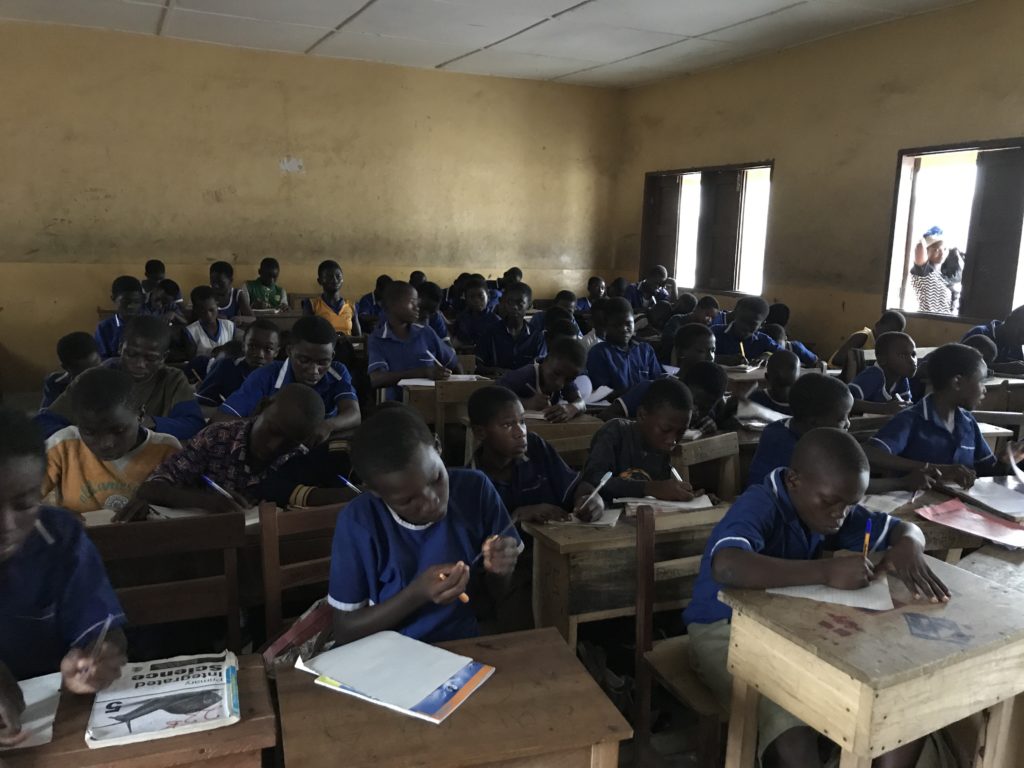
Within two days, I was able to visit 3 very different schools and collect data from all the 4th and 5th grade students at each of these schools.
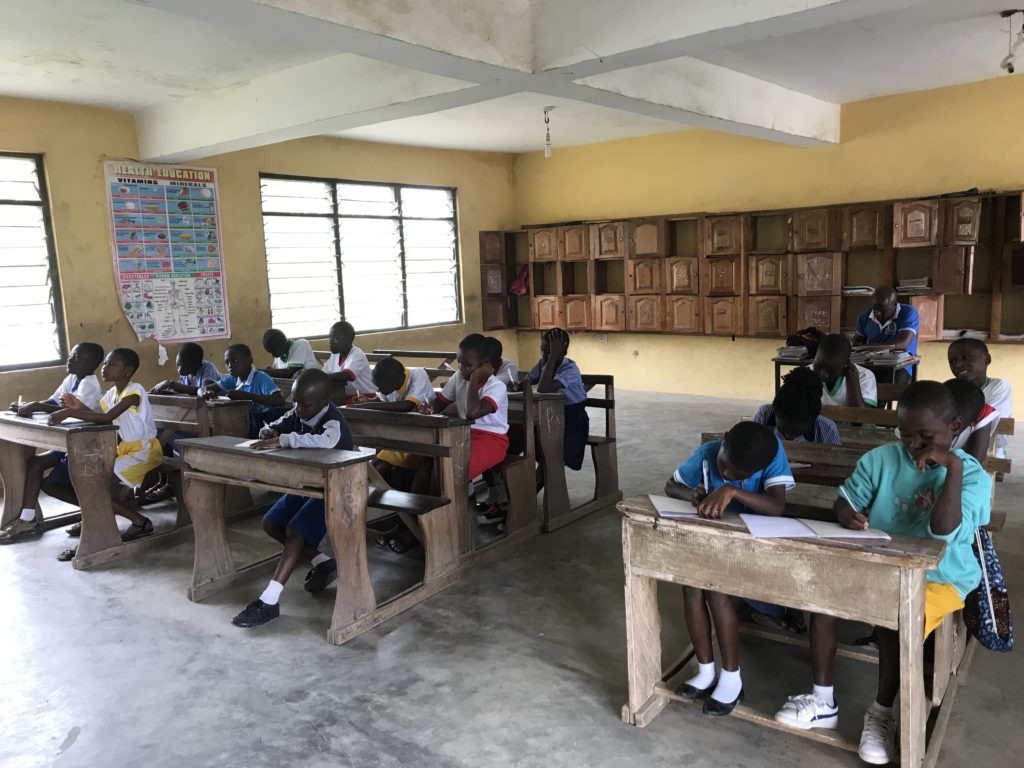
In hopes of determining the prevalence of Irlen syndrome in this region of Ghana, we began data collection with the administration of the Reading Strategies Questionnaire (RSQ), which gives as an idea of what symptoms of Irlen Syndrome are present among these students. More specifically, it assesses each student’s reading difficulties in addition to the amount of physical discomfort of the eyes or head he or she deals with. Though the RSQ only assesses risk, the data we have thus far is, in some ways, very surprising but perhaps expected due to the fairly high rate of Learning Disabilities in this population. Though our target population was 4th and 5th grade students, the age range within these two grades is much larger than I expected. There are students as young as 9, which isn’t unexpected, to as old as 16, which seemed fairly large to me.
For each classroom we entered, we handed each student a sheet of paper to record their answers to each of the questions on the RSQ. I would write on the board what demographic information (age, sex, grade, etc.) they needed to first write on the tops of their sheets of paper. The teacher or the CLED director would then read the questions from the RSQ aloud in front of the classroom, first in English and then furthering explaining the question in Twi to ensure that each student fully understood the question. Each student was able to answer with “Yes,” “No,” or “ST” which stood for sometimes.
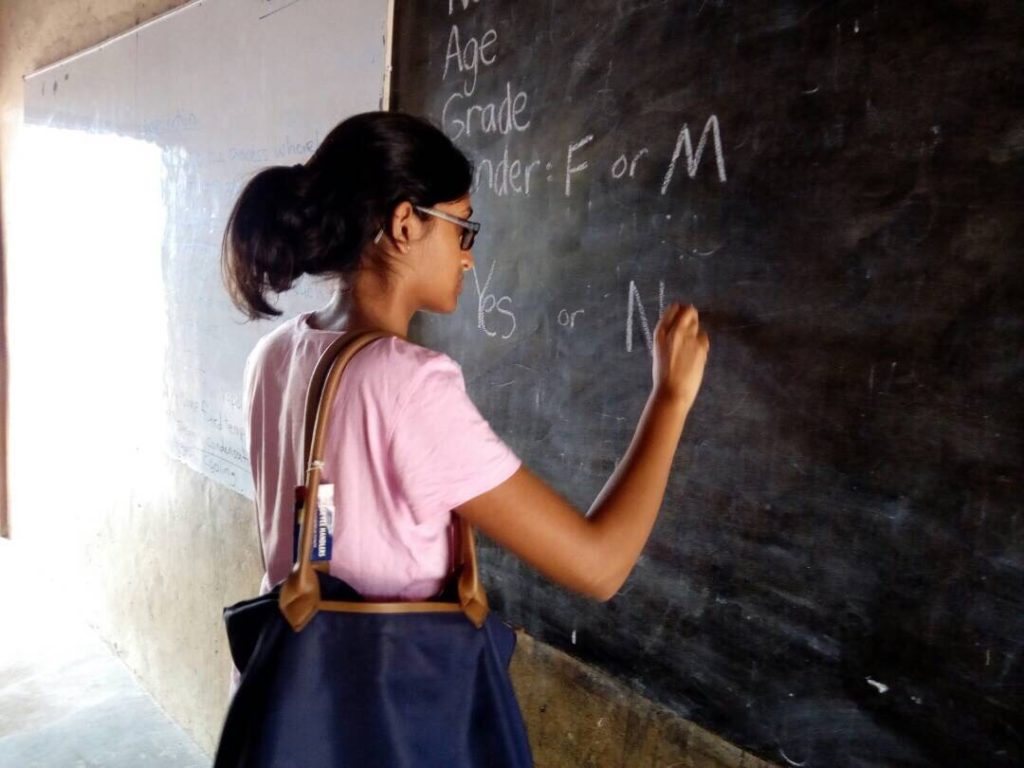
I interviewed a couple of teachers to better assess their perspectives on learning disabilities within the classroom and to get a better idea of how prevalent having a student with a learning disability was. The following are the questions I asked with the responses given by two different teachers as noted:
What percentage of your students do you think have learning disabilities?
R1: 30%
R2: 70%
How is your students’ academic performance compared to what you think it should be or to the national average?
R1: Average for this area.
R2: Not quite impressive; average for public schools but below average compared to all students in Ghana.
What are some common complaints you get from students with reading difficulties?
R1: that they can’t see the words in the board; they have headaches; sometimes they also complain of stomach pain.
R2: that they have visual impairments; many have “seizure disorder,” where it takes them time to pronounce words resulting in pausing when reading; the majority of students have not been taken through phonetics so they don’t have a basis for sounding out words; many don’t really complain because they fear being made fun of by their peers.
What do you think should be done to improve education for students with learning disabilities?
R1: start from the base; make sure that in teaching colleges, teachers are well prepared to handle such issues; have teacher trainings to educate teachers on how best to teach to students with learning disabilities; also, start at the base for learning to read by beginning with pronouncing different sounds and words when teaching reading.
R2: create a reading clinic environment or special schools for specifically helping students with such difficulties; have referral programs where students with reading difficulties are sent to special reading clinics located in central, community locations where they can get the specific help that they need.
Based on these two interviews alone, it is clear that not all teachers have a firm understanding of what it means for a student to have a learning disability (LD). Prior to interviewing these teachers, the knowledge I had been provided with was that the majority of students, especially in public schools, had some form of learning disability, which is really quite astonishing. It is also evident that not a lot has really been done in training these teachers on assessing students with LDs and teaching to students with LDs. I was told by the director of CLED that many of the students with learning disabilities not only fear being made fun of by their peers but also fear being made fun of or punished by their teachers. That is why CLED has fortunately begun pushing for more teacher trainings and parent trainings on what it means to have a LD and what methods can be used to allow for the most success for these students in an academic setting.
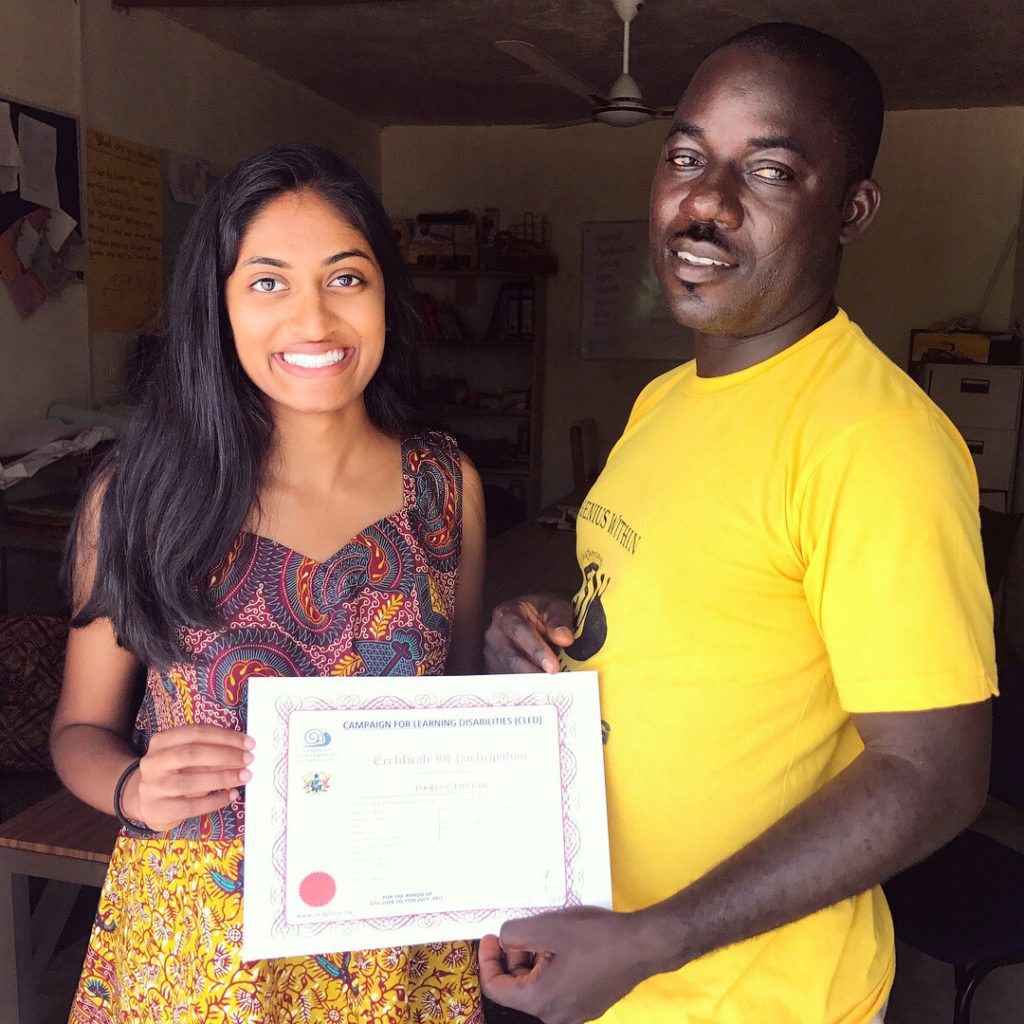
The ISF/CLED partnership is expanding this fall, when Irlen Diagnostician, Jeri LaVigne, will be traveling to Ghana to train all CLED staff as certified Irlen Screeners. Stay tuned for future updates and success stories from our friends in Ghana.
2017 Spring Scholarship Recipients
This month, ISF awarded nearly $4,500 in 2017 spring scholarships to help economically disadvantaged youth and adults receive Irlen diagnostic testing and spectral filters. The 14 scholarship recipients range in age from 11 to 68 years, and represent 9 different states: California, Oregon, Washington, Montana, Texas, Louisiana, Mississippi, North Carolina, and Florida. They are students, veterans, and former civil servants, and they have all been significantly impacted by symptoms of Irlen Syndrome.
Four of our spring scholarship recipients received the exclusive Pat Johnson Memorial Scholarship, reserved specifically for individuals from Texas and the immediate southern states where longtime Irlen diagnostician, Pat Johnson, worked tirelessly for over 20 years to bring Irlen solutions to those who need them most.
One of our recipients is currently home bound due to her extreme sensitivity to light, and another had to drop out of college after just one semester because of her Irlen Syndrome. As all of our spring scholarship recipients receive their Irlen Spectral Filters in the coming month, we look forward to following their progress and hearing how their lives change!
ISF awards scholarships for Irlen services and lab fees to US residents twice a year (fall and spring). Scholarship applications, and information about how to apply, can be obtained from any US Irlen Diagnostician. We are only able to provide these scholarships thanks to the generosity of people like you, so please consider making a donation to the Irlen Syndrome Foundation today.
2016 A Year In Review
We have been busy this year! Generosity from people like you has helped us change lives, advance research, and spread the word. Read below to find out more about specific projects and programs we funded in 2016, and learn about what we have in store for 2017.
Research At Cornell University
ISF awarded Cornell University neuroscientist, Dr. Adam Anderson, and his team of researchers at the Cognition and Affect Lab an ISF Research Grant to support their current brain imaging research. Dr. Anderson and his team are using fMRI to show that colors alter the speed with which visual stimuli are processed and perceived. They are examining the brain bases of this finding with the hope of providing objective evidence for a widespread role of color in shaping visual sensory cortical processing and its influences on higher-order brain regions. By influencing how visual sensory cortices communicate with higher brain regions, color filters may regulate brain activity patterns supporting various forms of high level cognition.
15 Individual Scholarship Awards
ISF awarded aid scholarships to 15 individuals this year. These scholarships provided diagnostic testing and Irlen Spectral Filters for individuals who would otherwise not be able to afford Irlen services. Among our group of 2016 scholarship recipients, we had 5 youth from the juvenile justice system, a former law enforcement officer whose on the job brain injury resulted in migraines, vertigo, and seizures that prevent her from working, and a high school student who missed over 50 days of school this year because of migraines and extreme fatigue caused by light sensitivity.
New Pilot School in Philadelphia
ISF awarded an Irlen Pilot School Program Grant to the Mastery Charter School Pickett Campus in Philadelphia, PA. Mastery Charter services a particularly high percentage of at-risk students in grades 6-12, with over 25% of the student body identified as having some type of specific learning disability. As an Irlen Pilot School, Master Charter will implement screening for Irlen Syndrome and provide colored overlays to students who require intervention. Student progress and improvement will be tracked and analyzed over a 1 year intervention period. Find out more about our pilot school program.
Outreach in Ghana
ISF partnered with the nonprofit, CLED – Campaign for Learning Disabilities, to educate teachers in Ghana about Irlen Syndrome and strategies for supporting students with the condition. CLED-Campaign for Learning Disabilities is a grassroot NGO with the goal of helping children with learning disabilities and co-occurring difficulties to improve their learning and reach their potential so that they can become valued members of their community. CLED trains parents, teachers, and communities on different subjects related to the needs of children with learning disabilities and co-occurring difficulties. We are excited about this new international partnership, and the opportunity to bring solutions for Irlen Syndrome to school children in Ghana.
Our Plans for 2017
In the coming year, ISF plans to double the number of scholarships awarded in 2016, add another Irlen Pilot School to service and support an entire student body, and increase our support of cutting-edge research that will help make assistance for Irlen Syndrome more available. You can make a difference too. Did you know that a $5 gift to ISF is enough to provide colored overlays for 2 children? Your generosity makes our work possible, and changes the lives of hundreds of children and adults every year. MAKE A DONATION


